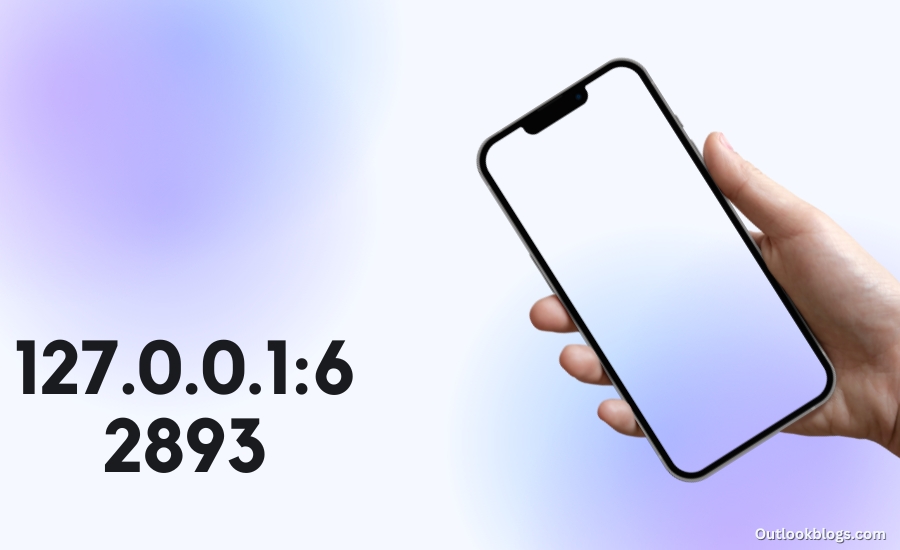Did you know your computer has its own special way of talking to itself? It’s true! The code 127.0.0.1:62893 is like a secret language that your computer uses to check if things are working correctly. This code helps programmers test and fix problems without sending data out into the big world of the internet. Understanding how 127.0.0.1:62893 works can make you feel like a computer wizard, able to solve technical puzzles with ease!
When you see 127.0.0.1:62893, think of it as your computer’s home address with a special door. The number 127.0.0.1 is your computer’s way of saying, “Hey, I’m talking to myself!” And 62893 is a specific door it uses to send and receive information. This setup is super important for testing programs, fixing errors, and learning how computers work. Let’s dive into what this code means and how you can use it to make your computer adventures even more exciting!
What Does 127.0.0.1:62893 Really Mean?
Understanding 127.0.0.1:62893 might seem tricky at first, but it’s quite simple. The numbers 127.0.0.1 represent your computer’s way of talking to itself, just like having a conversation in your head. When you see this address, it’s your computer’s home, called “localhost.” The numbers after the colon, 62893, are like a special door that opens to let certain things in and out.
When you use 127.0.0.1:62893, it’s like opening a secret passageway in your computer. This special address is used for testing and fixing things without letting them go outside. If you’re building a website or testing a program, this code helps you see how things work without risking your computer’s safety.
Imagine your computer is a big house with many doors. Each door has a number, like 62893, and leads to different rooms. By using 127.0.0.1 with a port like 62893, your computer knows which room to go to. This makes it easy for programs to communicate and work together without any confusion.
Why 127.0.0.1 is Called Localhost
The term “localhost” is a nickname for 127.0.0.1. It’s like a nickname for your home that everyone knows. When your computer uses 127.0.0.1, it talks to itself. This is super important for developers who want to test new things without the whole world seeing.
Localhost is a special address that only your computer knows. When you type 127.0.0.1 in your browser, it’s like asking your computer to show you what’s inside its own world. You can explore and play around without any danger from the outside.
One of the cool things about localhost is that it helps keep your computer safe. If you’re working on something and it breaks, it won’t mess up anything outside. This is why programmers love using 127.0.0.1; it’s like having a safe playground to test ideas without any worries.
Understanding Port Numbers Like 62893
Ports are like doors in your computer, and 62893 is one of those doors. Each port has a unique number, helping different programs know where to go. Some common ports are for websites, emails, or games. But 62893 can be used for special tasks like testing or custom applications.
When you see 127.0.0.1:62893, think of it as a private door for your computer’s special tasks. This door is only open for certain activities, so you don’t have to worry about strangers entering. It’s all about keeping things organized and safe inside your computer.
Choosing the right port number is important. If you pick a number that’s already in use, you might get confused. That’s why ports like 62893 are handy; they’re like secret doors just for you. Knowing how to use them can make you a computer wizard!
How 127.0.0.1:62893 Helps Developers Test Software
Developers love 127.0.0.1:62893 because it lets them test software safely. When creating a new app or website, they can use this code to try things out without going live. This means they can fix problems and make improvements before anyone else sees them.
Using 127.0.0.1:62893 is like having a practice field for developers. They can try new features, make mistakes, and learn from them without any pressure. It’s like rehearsing a play before the big performance, ensuring everything goes smoothly when it’s time to go live.
Testing software on localhost with a specific port like 62893 keeps things neat. Developers know exactly where to look if something goes wrong. They can fix issues quickly, making sure the final product is perfect for the users. This makes software development more efficient and fun!
The Magic of Loopback Addresses: 127.0.0.1

The magic of 127.0.0.1 lies in its ability to loop back to your computer. It’s like a boomerang that always returns to where it started. This loopback address helps test programs, check connections, and explore new ideas without leaving the computer.
Loopback addresses are special because they allow internal communication. Your computer uses 127.0.0.1 to talk to itself, like having an internal conversation. This keeps everything safe and controlled, making it easier to spot problems and fix them.
Using loopback addresses like 127.0.0.1 is crucial for developers and network administrators. They can simulate real-world scenarios and test how things work before going public. This helps them create reliable and secure software, ensuring everything works as expected.
Why Port 62893 Is Special for Your Computer
Port 62893 is special because it’s a private entrance to your computer’s world. While some ports are used for popular services, 62893 is free for custom use. This means you can use it for specific tasks like development and testing without any interference.
When your computer communicates using 127.0.0.1:62893, it creates a secure channel for specific activities. This ensures that your work is isolated and protected from external threats. It’s like having a private study room where you can focus and experiment without distractions.
Choosing a unique port like 62893 helps keep things organized. It allows different programs to run simultaneously without conflict. This organization is vital for developers who need to test multiple applications at once, ensuring everything runs smoothly.
Common Errors with 127.0.0.1:62893 and How to Fix Them
Using 127.0.0.1:62893 is usually smooth, but sometimes errors happen. Common problems include “Connection Refused” or “Address Already in Use.” These errors mean something’s not working right, but don’t worry! They can be fixed with a few simple steps.
If you see a “Connection Refused” message, it means the program you’re trying to reach isn’t running. Make sure to start the program and check your firewall settings. Firewalls can block access, so it’s essential to ensure they’re not stopping your connection.
An “Address Already in Use” error occurs when another program uses the port. You can check which programs are using 62893 and close any that shouldn’t be. Restarting your computer might also help clear up any conflicts. With these tips, you’ll have your system running smoothly again!
Safety Tips for Using 127.0.0.1:62893
Using 127.0.0.1:62893 is safe, but there are a few things to watch out for. Never open this port to the internet, as it could allow unwanted access to your computer. Keep your work private and secure by only using 127.0.0.1 for internal testing.
When running programs on 127.0.0.1:62893, ensure they’re from trusted sources. Avoid unknown applications that might try to exploit your system. It’s always better to be cautious and double-check everything before proceeding.
Keep your firewall updated and configured correctly. This helps protect your computer from any potential threats. By following these safety tips, you can enjoy the benefits of localhost and port 62893 without any worries
Troubleshooting 127.0.0.1:62893: A Step-by-Step Guide
Troubleshooting 127.0.0.1:62893 is easy with the right steps. First, check if the service you’re trying to access is running. Use tools like netstat or lsof to see if any programs use port 62893. This helps identify any conflicts or issues.
Next, verify your firewall settings. Ensure that your firewall isn’t blocking access to 127.0.0.1:62893. You might need to add an exception for the port or program you’re using. This can prevent connection issues and keep things running smoothly.
Finally, restart your network services if needed. Sometimes, a simple restart can resolve underlying problems. If you’re still facing issues, consider seeking help from a tech expert. With this guide, you’ll be able to troubleshoot and fix any problems with ease!
You May Also Like: Myhtspace
Why You Shouldn’t Expose 127.0.0.1:62893 to the Internet
Exposing 127.0.0.1:62893 to the internet is not a good idea. This address is meant for internal communication, keeping your work private and secure. By opening it up, you risk letting unauthorized users access your system, leading to potential security threats.
The beauty of 127.0.0.1:62893 lies in its isolation. It creates a safe environment for testing and development without external interference. This privacy is crucial for maintaining the integrity of your projects and ensuring everything runs smoothly.
If you need to access your work remotely, consider using secure methods like VPNs or SSH tunnels. These tools provide safe access without compromising your system. Remember, keeping 127.0.0.1 local is the best way to protect your computer and its data.
Exploring the Role of Localhost in Software Development
Localhost, represented by 127.0.0.1, plays a vital role in software development. It allows developers to test and build applications locally without exposing them to the internet. This helps catch bugs and errors before releasing the product to the public.
Using 127.0.0.1 provides a controlled environment for developers. They can experiment with new features, run simulations, and ensure everything works perfectly. This testing phase is essential for creating high-quality software that users will love.
Developers also benefit from the speed and efficiency of localhost. Since data doesn’t leave the computer, everything runs faster, making testing more enjoyable. Localhost truly is a developer’s best friend, enabling innovation and creativity in a safe space.
Is 127.0.0.1:62893 Safe to Use? Here’s What You Need to Know
Using 127.0.0.1:62893 is generally safe, but it’s important to be cautious. This code allows your computer to communicate internally, providing a secure space for development and testing. However, like any tool, it must be used responsibly to avoid potential risks.
One key safety tip is to keep 127.0.0.1:62893 private. Avoid exposing it to external networks, as this could open doors to unauthorized access. Keeping things local ensures your work remains secure and protected from potential threats.
Always use trusted programs when working with 127.0.0.1:62893. Verify sources and double-check settings to maintain a secure environment. By following these guidelines, you can enjoy the benefits of this code while keeping your computer safe.
How to Check What’s Using Port 62893 on Your Computer

If you’re curious about what’s using port 62893, you can easily find out. Use simple commands on your computer to check which programs are running on this port. This helps you manage and organize your system, ensuring everything runs smoothly.
On Windows, open Command Prompt and type netstat -ano | findstr :62893. This command shows you which processes use port 62893. On Mac or Linux, open Terminal and type lsof -i :62893. You’ll see a list of programs using the port, helping you keep track of your system.
If you find something unexpected, you can investigate further. Maybe you need to close a program or change its settings. By knowing what’s happening with 62893, you can maintain a well-organized and efficient computer environment.
Real-World Examples of 127.0.0.1:62893 in Action
Seeing 127.0.0.1:62893 in action can help you understand its importance. Imagine building a website and wanting to test it before going live. By using this code, you can view your site locally, ensuring everything works perfectly before sharing it with the world.
Another example is debugging an app. Developers use 127.0.0.1:62893 to connect to their applications and see what’s happening inside. This helps them identify and fix problems, making sure the app runs smoothly for users.
Setting up a database is another scenario where 127.0.0.1:62893 comes in handy. It allows the database to communicate with other programs on the same machine, ensuring seamless integration. These real-world examples show how this code is essential for development and testing.
FAQs About 127.0.0.1:62893: Answers to Common Questions
Many people have questions about 127.0.0.1:62893, and here are some common ones answered. Can others see your 127.0.0.1:62893? No, this address only works on your computer. It’s a private communication channel, ensuring your work remains secure.
Do you need to worry about hackers using 127.0.0.1:62893? Usually not, as this address is for internal use only. However, it’s essential to be cautious with unknown programs that might try to exploit it. Always use trusted software and follow security best practices.
Can you change 127.0.0.1 to something else? It’s best to leave this address as is, as it’s a standard for localhost communication. Changing it might cause confusion or errors. If you need a different port, you can easily change the number, like using 62894 instead of 62893.
Fun Facts About 127.0.0.1:62893 You Didn’t Know
Here are some fun facts about 127.0.0.1:62893 that might surprise you. Did you know that 127.0.0.1 is part of a range of loopback addresses reserved for internal communication? This range includes addresses from 127.0.0.0 to 127.255.255.255.
The port number 62893 might seem random, but it’s chosen for its uniqueness. Developers often select less common ports for testing to avoid conflicts with standard services. This makes 62893 a popular choice for custom applications and experiments.
Using 127.0.0.1:62893 is like having a secret club only your computer knows about. It’s a place where developers can play, test, and innovate without any outside interference. These fun facts highlight the unique and essential role this code plays in computing.
127.0.0.1:62893: The Key to Secure Local Testing
127.0.0.1:62893 is a vital tool for secure local testing. It provides a safe environment for developers to test their applications without exposing them to the internet. This isolation ensures that any issues can be resolved before going live, protecting both the software and users.
Using 127.0.0.1:62893 allows for thorough testing and debugging. Developers can simulate real-world scenarios and ensure their applications work perfectly. This meticulous testing process helps create high-quality software that’s reliable and efficient.
By keeping everything local, 127.0.0.1:62893 reduces security risks. It prevents unauthorized access and keeps sensitive information safe. This secure testing environment is crucial for developers who want to deliver top-notch products without compromising security.
Optimizing Your Network with 127.0.0.1:62893
Optimizing your network using 127.0.0.1:62893 can enhance your computer’s performance. By running tests locally, you can quickly identify and fix any bottlenecks or issues. This optimization leads to a smoother and more efficient network experience.
Using 127.0.0.1:62893 allows for fine-tuning network settings. Developers can experiment with different configurations to find the best setup for their applications. This hands-on approach helps improve performance and ensures everything runs seamlessly.
A well-optimized network is essential for maintaining productivity and user satisfaction. By leveraging the power of 127.0.0.1:62893, developers can create a robust and reliable network environment that meets the demands of modern computing.
127.0.0.1:62893 Explained: A Beginner’s Guide
If you’re new to 127.0.0.1:62893, don’t worry! This beginner’s guide will help you understand its significance. The address 127.0.0.1 is your computer’s way of talking to itself, known as “localhost.” It’s like a secret world where only your computer can enter.
The port number 62893 is a unique door that allows specific communication. When you see 127.0.0.1:62893, it means your computer is having a private chat with itself. This setup is crucial for testing and development, providing a safe space for exploration.
Learning about 127.0.0.1:62893 opens up a world of possibilities. It enables you to test software, troubleshoot issues, and experiment with new ideas. This beginner’s guide is your first step into the exciting realm of localhost communication.
Advanced Uses of 127.0.0.1:62893 for Developers
For developers looking to explore advanced uses of 127.0.0.1:62893, there’s much to discover. This code allows for complex testing scenarios and simulations, enabling developers to push the boundaries of innovation. It’s a playground for creativity and experimentation.
One advanced use is testing microservices and containerized applications. Developers can configure multiple services to communicate via 127.0.0.1:62893, creating a seamless and integrated development environment. This setup is perfect for modern software development practices.
Developers can also use 127.0.0.1:62893 for custom analytics and monitoring tools. By running these tools locally, they can gather insights and optimize performance without any external interference. This advanced usage highlights the versatility and power of localhost communication.
Conclusion
In conclusion, 127.0.0.1:62893 is like a magical secret code for your computer. It helps your computer talk to itself safely and lets developers test their work without any worries. By using this special address, you can make sure everything works perfectly before sharing it with the world. It’s like practicing for a big show, so when you go live, everything is just right!
Understanding 127.0.0.1:62893 opens up a whole new world of possibilities for anyone who loves computers. Whether you’re building a new app, testing a website, or just curious about how things work, this code is your best friend. Remember, learning about your computer’s secret language makes you smarter and more confident in handling tech adventures. Keep exploring, and have fun discovering more about the amazing world of computers!





